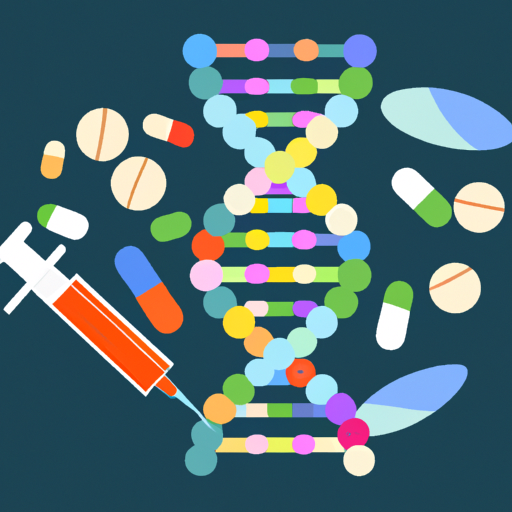Revolutionizing Medicine: Exploring the Breakthroughs in Drug Development for Diagnosis, Treatment, Symptoms, and Causes

In today’s rapidly advancing field of medicine, the development of new drugs plays a pivotal role in improving the diagnosis, treatment, and management of various medical conditions. This article aims to provide a comprehensive overview of the intricate process involved in the creation of new drugs, from understanding the symptoms and diagnosis of diseases to exploring the innovative approaches and breakthroughs in drug development. By delving into the causes behind the development of new drugs, we will uncover the research process and the cutting-edge innovations that have revolutionized the field. Additionally, we will navigate the journey from diagnosis to treatment, exploring the remarkable advancements in drug development for various conditions. Join us as we unravel the complexities of the development of new drugs, shedding light on the breakthroughs that have the potential to transform countless lives.
1. "Understanding the Development of New Drugs: A Comprehensive Overview of Diagnosis, Treatment, and Symptoms"
The development of new drugs is a complex and lengthy process that involves various stages, from the identification of a potential drug target to its final approval for clinical use. It is crucial to understand the different aspects of this process, including diagnosis, treatment, and symptoms, in order to comprehend the significance and impact of new drugs on medical advancements.
Diagnosis is the first step in the development of new drugs. It involves identifying a disease or condition and determining its underlying causes and symptoms. Accurate diagnosis is essential for developing targeted therapies that address the specific mechanisms of a disease. In recent years, advancements in diagnostic technologies have revolutionized the field, allowing for earlier and more precise detection of diseases. This has enabled researchers to develop drugs that can intervene at an early stage, leading to better treatment outcomes.
Once a disease has been diagnosed, the next step is to develop effective treatment strategies. Treatment options can vary depending on the nature and severity of the disease. Traditional treatments include surgery, radiation therapy, and chemotherapy. However, the development of new drugs has expanded the treatment landscape, offering more targeted and personalized approaches. For instance, the advent of targeted therapies has allowed for the development of drugs that specifically inhibit the growth of cancer cells while sparing healthy cells, minimizing side effects and improving patient outcomes.
Understanding the symptoms associated with a particular disease is crucial for the development of new drugs. Symptoms are the manifestations of an underlying condition and can vary widely from one disease to another. By studying and analyzing these symptoms, researchers can gain insights into the mechanisms of the disease and identify potential drug targets. For example, in the case of neurodegenerative diseases like Alzheimer’s or Parkinson’s, studying the symptoms such as memory loss or motor dysfunction has helped researchers identify specific molecules or pathways that can be targeted by new drugs.
The causes of diseases play a pivotal role in the development of new drugs. Identifying the root causes helps researchers design drugs that directly address the underlying mechanisms and pathways involved. For instance, in the case of genetic disorders, understanding the genetic mutations responsible for the disease enables
2. "Unveiling the Causes Behind the Development of New Drugs: A Closer Look at the Research Process and Innovations"
The development of new drugs is a complex and dynamic process that involves extensive research, experimentation, and innovation. Scientists and researchers dedicate countless hours to unraveling the causes behind diseases and finding effective treatments. This section delves into the research process and the innovations that drive the development of new drugs.
At the heart of drug development lies the identification of the causes behind various diseases. Understanding the underlying mechanisms and pathways that lead to the onset of a disease is crucial for devising targeted treatments. The research process often begins with the identification of a specific disease or condition that requires attention. Researchers then embark on a journey to uncover the root causes, examining factors such as genetic predispositions, environmental factors, lifestyle choices, and biochemical imbalances.
One key approach in understanding the causes behind diseases is through observational studies. These studies involve observing and collecting data from individuals or populations affected by a particular disease. By analyzing the collected data, researchers can identify patterns, risk factors, and potential causes that contribute to the development of the disease. Observational studies can provide valuable insights into the complex interplay between genetics, lifestyle, and environmental factors.
Furthermore, genetic research plays a significant role in understanding the causes of diseases. The advancements in genetic technology, such as genome sequencing and genetic mapping, have revolutionized the field of medicine. By studying the genetic makeup of individuals affected by a disease, scientists can identify specific genes or mutations that are associated with the condition. This knowledge opens up avenues for targeted therapies that address the underlying genetic abnormalities.
In recent years, the advent of high-throughput screening techniques has accelerated the drug development process. These techniques allow scientists to test thousands of chemical compounds quickly and efficiently to identify potential drug candidates. By screening large libraries of compounds, researchers can identify molecules that interact with specific disease targets or pathways. This approach expedites the identification of potential drug candidates, saving time and resources in the drug development pipeline.
The integration of technology and data analysis has also played a significant role in uncovering the causes behind diseases. With the rise of big data and artificial intelligence,
3. "Navigating the Journey from Diagnosis to Treatment: Exploring Breakthroughs in Drug Development for Various Conditions"
Navigating the Journey from Diagnosis to Treatment: Exploring Breakthroughs in Drug Development for Various Conditions
In the realm of modern medicine, the development of new drugs plays a pivotal role in the diagnosis, treatment, and management of various conditions. Each year, countless individuals worldwide are diagnosed with illnesses ranging from chronic diseases to rare genetic disorders. However, the journey from diagnosis to effective treatment can often be a challenging and complex process. Fortunately, with advancements in drug development, there have been remarkable breakthroughs that offer hope and improved outcomes for patients.
The first step in this journey begins with an accurate diagnosis. Accurate and timely diagnosis is crucial for determining the most suitable treatment approach. Medical professionals employ various diagnostic tools and techniques, including laboratory tests, imaging scans, genetic testing, and clinical examinations, to identify the underlying cause of the symptoms. However, the accuracy of diagnosis heavily relies on the availability of effective and reliable diagnostic tools. In recent years, significant progress has been made in the development of innovative diagnostic technologies, such as precision medicine and liquid biopsies, which enable healthcare providers to detect diseases at their earliest stages, leading to more targeted and personalized treatment options.
Once a diagnosis is established, the next challenge lies in finding the most appropriate treatment for the specific condition. Drug development plays a vital role in this aspect. Extensive research and clinical trials are conducted to identify compounds that can effectively target the underlying causes or symptoms of a disease. This process involves rigorous testing, ensuring the safety, efficacy, and potential side effects of the drug are thoroughly evaluated. Breakthroughs in drug development have led to the discovery of novel therapeutic agents, including small molecules, biologics, and gene therapies, which have revolutionized the treatment landscape for numerous conditions.
For instance, in the field of oncology, targeted therapies have emerged as a significant breakthrough in the treatment of various cancers. These therapies are designed to specifically target cancer cells, while sparing healthy cells, resulting in reduced side effects and improved overall survival rates. Similarly, the development of immunotherapies,



